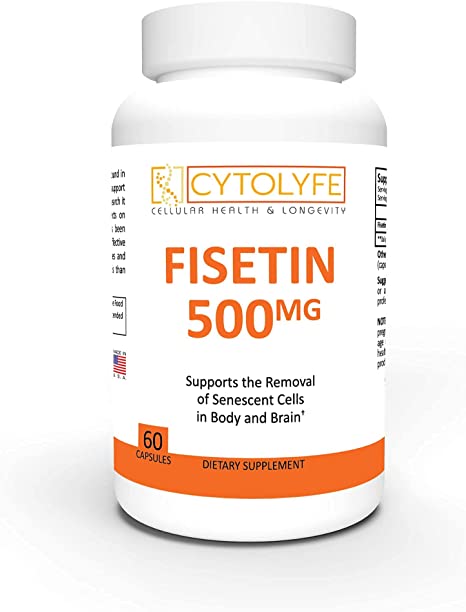Senolytics is an emerging field of research to identify natural compounds that can be
used to eliminate senescent cells. Recently it was discovered that Fisetin, a naturally
occurring plant compound, has the ability to specifically target and eliminate
senescent cells.[1] Fisetin has been proven to have the most potent senotherapeutic
effect on senescent cells and is the most effective at reducing senescent markers.
The director of the Institute on the Biology of Aging and Metabolism at the
University of Minnesota, commenting on the selectivity of Fisetin to target senescent
cells, said in a recent article in Newsweek: "It turns out that Fisetin is a natural
product that actually we were able to show very selectively and effectively kills these
senescent cells or at least dials back their bad secretions or inflammatory proteins."
It’s well established that senescent cells accelerate the accumulation of more
senescent cells.[2] Removing these cells eliminates the pro-inflammatory chemicals
they secrete and protects the body from damage.[3]
The most interesting finding is that Fisetin can pass the blood brain barrier to also
eliminate senescent cells in the brain. This has the effect of dialing back the immune
response in the brain as well as improving cognition.[4]
Senescent cells are caused by the accumulation of DNA or telomere damage that
arrest replication yet have a resistance to apoptosis. These particular cells don’t die
but rather become zombie cells that secrete pro-inflammatory cytotoxins that
damage adjacent cells and accelerate the aging process. Since these inflammatory
secretions are a normal result of aging, even a relatively low amount of senescent
cells is sufficient to cause tissue dysfunction and play a causal role in driving aging
and age-related diseases. There are numerous therapeutic benefits to removing
senescent cells such as reducing inflammation, decreasing macromolecular
dysfunction and enhancing the function of stem cells.
Safety
Fisetin has been shown to be safe. There is no evidence to date for either short or
long-term toxicity.[5] And, more importantly, no adverse effects of Fisetin have been
reported even when given at high doses.[6]
Fisetin 500mg is delivered in one 500mg capsule in either 30 or 60 servings.
footnotes:
[1] https://www.fightaging.org/archives/2018/11/senescent-cells-accelerate-the-accumulation-of-more-senescent-cells/
[2] https://www.ncbi.nlm.nih.gov/pmc/articles/PMC6197652/
[3] https://www.ncbi.nlm.nih.gov/pubmed/30279143
[4] https://www.ncbi.nlm.nih.gov/pubmed/22234339
[5] https://www.ncbi.nlm.nih.gov/pmc/articles/PMC5527824/
[6] https://www.ncbi.nlm.nih.gov/pubmed/30279143


